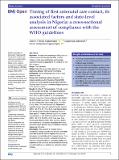Files in this item
Timing of first antenatal care contact, its associated factors and state-level analysis in Nigeria : a cross-sectional assessment of compliance with the WHO guidelines
Item metadata
| dc.contributor.author | Fagbamigbe, Adeniyi Francis | |
| dc.contributor.author | Olaseinde, Olugbenga | |
| dc.contributor.author | Fagbamigbe, Omon Stellamaris | |
| dc.date.accessioned | 2021-10-01T16:30:06Z | |
| dc.date.available | 2021-10-01T16:30:06Z | |
| dc.date.issued | 2021-09 | |
| dc.identifier | 276116993 | |
| dc.identifier | b1a4473d-b968-4c91-9c19-38ddfacbc10f | |
| dc.identifier | 85117273302 | |
| dc.identifier | 000701972000021 | |
| dc.identifier.citation | Fagbamigbe , A F , Olaseinde , O & Fagbamigbe , O S 2021 , ' Timing of first antenatal care contact, its associated factors and state-level analysis in Nigeria : a cross-sectional assessment of compliance with the WHO guidelines ' , BMJ Open , vol. 11 , no. 9 , e047835 . https://doi.org/10.1136/bmjopen-2020-047835 | en |
| dc.identifier.issn | 2044-6055 | |
| dc.identifier.other | Jisc: 0c46dab7091243c7a2c6b850fd45500e | |
| dc.identifier.other | publisher-id: bmjopen-2020-047835 | |
| dc.identifier.uri | https://hdl.handle.net/10023/24075 | |
| dc.description.abstract | Objectives : To assess the compliance of WHO guidelines on the timeliness of antenatal care (ANC) initiation in Nigeria and its associated factors and to provide subcountry analysis of disparities in the timing of the first ANC in Nigeria. Design : Cross-sectional. Setting : Nationally representative data of most recent pregnancies between 2013 and 2018 in Nigeria. Participants : Women with pregnancies within 5 years before the study. Primary and secondary outcome measures : The outcome variable was the trimesters of the first ANC contact. Data were analysed using descriptive statistics, bivariable and multivariable multinomial logistic regression at 5% significance level. Results : Of all the 21 785 respondents, 75% had at least one ANC contact during their most recent pregnancies within the five years preceding the data collection. Among which 24% and 63% started in the first and second trimester, respectively. The proportion who started ANC in the first trimester was highest in Benue (44.5%), Lagos (41.4%) and Nasarawa (39.3%) and lowest in Zamfara (7.6%), Kano (7.4%) and Sokoto (4.8%). Respondents aged 40–49 years were 65% (adjusted relative risk ratio (aRRR: 1.65, 95 % CI: 1.10 to 2.45) more likely to initiate ANC during the first trimester of pregnancy relative to those aged 15–19 years. Although insignificant, women who participate in their healthcare utilisation were 4% (aRRR: 1.04, 95 % CI: 0.90 to 1.20) times more likely to have early initiation of ANC. Other significant factors were respondents’ and spousal educational attainment, household wealth quintiles, region of residence, ethnicity, religion and birth order. Conclusions : Only a quarter of pregnant women, initiated ANC contact during the first trimester with wider disparities across the states in Nigeria and across the background characteristics of the pregnant women. There are needs to enhance women’s autonomy in healthcare utilisation. Concerted efforts on awareness creation and empowerment for women by all stakeholders in maternal and child healthcare are antidotes for early ANC contact initiation. | |
| dc.format.extent | 14 | |
| dc.format.extent | 2052914 | |
| dc.language.iso | eng | |
| dc.relation.ispartof | BMJ Open | en |
| dc.subject | HQ The family. Marriage. Woman | en |
| dc.subject | RA0421 Public health. Hygiene. Preventive Medicine | en |
| dc.subject | RG Gynecology and obstetrics | en |
| dc.subject | 3rd-DAS | en |
| dc.subject | SDG 3 - Good Health and Well-being | en |
| dc.subject.lcc | HQ | en |
| dc.subject.lcc | RA0421 | en |
| dc.subject.lcc | RG | en |
| dc.title | Timing of first antenatal care contact, its associated factors and state-level analysis in Nigeria : a cross-sectional assessment of compliance with the WHO guidelines | en |
| dc.type | Journal article | en |
| dc.contributor.institution | University of St Andrews. School of Medicine | en |
| dc.contributor.institution | University of St Andrews. Population and Behavioural Science Division | en |
| dc.identifier.doi | https://doi.org/10.1136/bmjopen-2020-047835 | |
| dc.description.status | Peer reviewed | en |
This item appears in the following Collection(s)
Items in the St Andrews Research Repository are protected by copyright, with all rights reserved, unless otherwise indicated.

